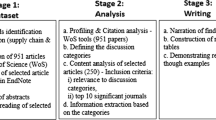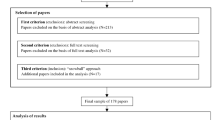Abstract
In this paper, we first define sustainable supply chain, and its value, as a paradigm which pursues the maximization of supply chain profitability while taking its environmental and societal responsibilities. Secondly, we compare the supply chain surplus between the conventional and sustainable supply chains by means of adopting the basic economic analysis based on the concept of externality and social surplus in welfare economics. Through the proposed analysis, we show the possibility of sustainable supply chains which can provide more supply chain surplus to the companies. Finally, some limitations of this paper and future research directions are also presented.









Similar content being viewed by others
References
Ahn YG, Lee YH (2005) A study on concept and definition of corporate sustainability management. J Environ Manage 3(1):1–21
Beamon BM (1999) Designing the green supply chain. Logist Inf Manag 12(4):332–342
Bhattacharya CB, Sen S (2004) Doing better at doing good: when, why, and how consumer respond to corporate social initiatives. Calif Manag Rev 47(1):91–116
Biehal GJ, Sheinin DA (2007) The influence of corporate messages on the product portfolio. J Mark 71(2):12–25
Brunk KH, Blumelhuber C (2011) One strike and you’re out: qualitative insights into the formation of consumers’ ethical company or brand perceptions. J Bus Res 64:134–141
Business Week (2005) Europe’s push for less-toxic tech (online edition), August 9
Carrigan M, Attalla A (2001) The myth of the ethical consumer—do ethical matter in purchase behavior? J Consum Mark 18(7):560–578
Carroll AB (1979) A three-dimensional conceptual model of corporate performance. Acad Manag Rev 4(4):490–510
Carter CR, Jennings MM (2004) The role of purchasing in corporate social responsibility: a structural equation analysis. J Bus Logist 25(1):145–186
Carter CR, Rogers DS (2008) A framework of sustainable supply chain management: moving toward new theory. Int J Phys Distrib Logist Manag 38:360–387
Ciliberti F, Pontrandolfo P, Scozzi B (2008) Logistics social responsibility: standard adoption and practices in Italian companies. Int J Prod Econ 113:88–106
de Brito MP, van der Laan EA (2010) Supply chain management and sustainability: procrastinating integration in mainstream research. Sustainability 2:859–870
DeSimon L, Popoff F (1997) Eco-efficiency—the business link to sustainable development. MIT Press, Cambridge
Doane D (2005) The myth of CSR. Stanf Soc Innov Rev 3(3):23–29
Elkington J (1994) Towards the sustainable corporation: win–win-win business strategies for sustainable development. Calif Manag Rev 36(2):90–100
Friedman M (1970) The social responsibility of business is to increase its profits. N Y Times Mag 33(30):122–127
Gildia RL (1995) Consumer survey confirms corporate social responsibility affect buying decisions. Public Relat Q 39(4):20–21
Gladwin TN, Kennelly JJ, Krause TS (1995) Shifting paradigms for sustainable development: implications for management theory and research. Acad Manag Rev 20(4):874–907
Guide VDR (2000) Production planning and control for remanufacturing: industry practice and research needs. J Operat Manag 18:467–483
Guide VDR, Srivastava R, Krause ME (1997) Product structure complexity and scheduling of operations in recoverable manufacturing. Int J Prod Res 35(11):3179–3199
Jorjani S, Leu J, Scott C (2004) Model for the allocation of electronics components to reuse options. Int J Prod Res 42(6):1131–1145
Kleindorfer P, Singhal K, Wassenhove L (2005) Sustainable operations management. Prod Oper Manag 14(4):482–492
Krajnc D, Glavič P (2005) How to compare companies on relevant dimensions of sustainability. Ecol Econ 55:551–563
Krikke H (1998) Recovery strategies and reverse logistics networks design, Doctoral dissertation, University of Twente, Twente
Linton JD, Klassen R, Jayaraman V (2007) Sustainable supply chains: an introduction. J Oper Manag 25:1075–1082
Madrigal R, Boush DM (2008) Social responsibility as a unique dimension of brand personality and consumers’ willingness to reward. Psychol Mark 25(6):538–564
Maignan I (2001) Consumer’s perceptions of corporate social responsibilities: a cross-cultural comparison. J Bus Ethics 30(1):57–72
Mankiw NG (2007) Principles of economics. Thomson, Boston
McWilliams A, Siegel DS, Wright PM (2006) Corporate social responsibility: strategic implications. J Manage Stud 43(1):1–18
Oppenheim J, Bonini S, Bielak D, Kehm T, Lacy P (2007) Shaping the new rules of competition: UN global compact participant mirror. McKinsey & Company, London
Östlin J, Sundin E, Björkman M (2008) Importance of closed-loop supply chain relationships for product remanufacturing. Int J Prod Econ 115:336–348
Rocha M, Searcy C, Karapetrovic S (2007) Integrating sustainable development into existing management system. Total Qual Manag 18(1–2):83–92
Savaskan RC (2004) Closed-loop supply chain models with product remanufacturing. Manage Sci 50(2):239–252
Seuring S, Müller M (2008) From a literature review to a conceptual framework for sustainable supply chain management. J Clean Prod 16:1–12
Ulhøi JP (1995) Corporate environmental and resource management: in search of a new managerial paradigm. Eur J Oper Res 80:2–15
Van der Laan E (1997) The effects of remanufacturing on inventory control. Doctoral dissertation, Erasmus University, School of Management, Rotterdam
Van Marrewijk M, Were M (2003) Multiple levels of corporate sustainability. J Bus Ethics 44:107–119
Wagner M, Schaltegger S (2004) The effect of corporate environmental strategy choice and environmental performance on competitiveness and economic performance: an empirical study of EU manufacturing. Eur Manag J 22(5):557–572
WCED (World Commission on Environment and Development) (1987) Our common future. Oxford University Press, Oxford
Zhou Z, Cheng S, Hua B (2000) Supply chain optimization of continuous process industry with sustainability consideration. Comput Chem Eng 24:1151–1158
Zsidisin GA, Siferd SP (2001) Environmental purchasing: a framework for theory development. Eur J Purch Supply Manag 7(1):61–73
Acknowledgments
This work was supported by the Korea Research Foundation Grant funded by the Korean Government (MOEHRD, Basic Research Promotion Fund) (KRF-2007-341-D00310).
Author information
Authors and Affiliations
Corresponding author
Rights and permissions
About this article
Cite this article
Kim, K., Jeong, B. & Jung, H. Supply chain surplus: comparing conventional and sustainable supply chains. Flex Serv Manuf J 26, 5–23 (2014). https://doi.org/10.1007/s10696-012-9163-2
Published:
Issue Date:
DOI: https://doi.org/10.1007/s10696-012-9163-2




